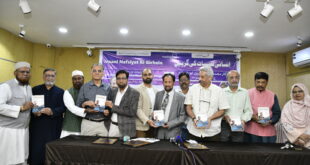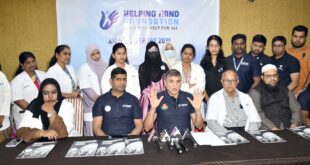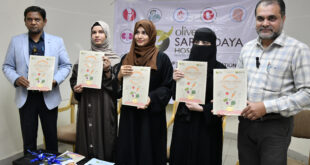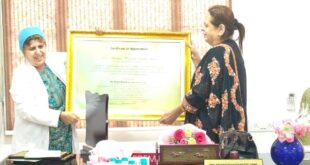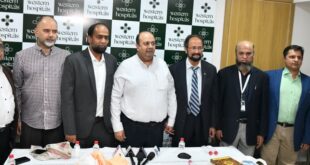At a time when one’s everyday life is inevitably influenced by the social networks one uses and the propagandas that brews there, telling the truth from the fake is almost impractical. This is true at least for the common man, the tragic victims of such misinformation. Thousands of lives have been lost in the post-Covid era to the twin evils of misinformation and disinformation, and the first line of defense against such propaganda is informed journalists, said communication and health experts.
Speaking during the two-day Critical Appraisal Skills (CAS) workshop organized by UNICEF in Dehradun, fact-checking experts and veteran journalists working closely with the organization to fight such propaganda, urged participating and prospective journalists to thoroughly verify the authenticity and contextual presentation of each news item so that it curbs the spread of misinformation. The niche course, first conceived in 2014 by UNICEF, aims to empower journalists with the tools and skills necessary to curb both misinformation and disinformation.
Speakers at the workshop emphasized that the lines between news and opinion have blurred for the common man with the increasingly explosive use of social media. But for the uneducated, information from social media rumor mills is nothing less than deathly hallows. “A simple propaganda may claim hundreds of innocent lives”, said fact-checking expert and veteran journalist Pankaj Pachauri.
Don’t believe everything you see on social media, he said. Mr. Sanjay Abhigyan, former Executive Editor of Amar Ujala daily newspaper said ‘social media has the power to beget constructive change. He explained how reports on social media and the articles that arose from such reports contributed to newsmaking and fighting misinformation.
Experts from across different disciplines deliberated on issues that plagued vaccination drives in the pre-Covid and post-Covid eras such as propaganda against Routine Immunization of children, and the use of Covid-19 vaccines and antibiotics in the context of misinformation. They also stressed the importance of the primary health care system in the country’s fight against malnutrition emphasizing the intake of optimum nutrient mix in meals and quality of food over quantity. Misconceptions about the use and overuse of antibiotics were also addressed during the inaugural day of the program.
Originally designed for healthcare professionals in the United Kingdom, an adaptation of the course developed in collaboration with Oxford University and Thomson Reuters in association with the Indian Institute of Mass Communication has been adapted by UNICEF. Ever since the organization has trained over 5000 communication professionals arming them with the skills to ward off these evils. The Indian Institute of Mass Communication and MANUU has partnered with UNICEF to impart these learnings to their mass communication and journalism students.
Nearly 150 media professionals hailing from both state-owned and private organizations cutting through print, electronic and radio platforms across India were treated to the comprehensive workshop on evidence-based reporting and fact-checking in health journalism. The purpose of the workshop is to empower journalists with the critical skills necessary to report on child health. Best practices on child health reporting including sensitive issues such as evidence-based reporting and fact-checking, the importance of nutrition, and the role of the primary healthcare system in building a healthy population were discussed.
Participating speakers also stressed the importance of breastfeeding infants, and termed it as the first step a mother can take to protect her child from malnutrition.
Citing functional gains from its flagship program, program panelists said ‘UNICEF created an army of informed reporters with its CAS program five years before the pandemic hit which helped hundreds of reporters apply their learning experiences to curb misinformation and propaganda in the covid rumor mill.
Speaking on the occasion Zafrin Chowdhury, Chief of Communication, Advocacy and Partnerships, UNICEF said “the recognition earned by UNICEF from online platforms like Meta as an authentic source of information means a lot. She added that health is a huge area for work. Vaccine hesitancy and doubts about routine immunization must be addressed.
Ms. Chowdhury added that India is a large country. There are some people who do not have access to primary Healthcare and such a population has become victim to malnutrition problems like stunting and wasting which is already compromising their immunity. If such a population misses vaccination (due to myths and negative propaganda), they’ll be at an even greater risk. We are working with the Government of India to address such problems”, she added.
Sanjay Abhigyan, Former Executive Editor, Amar Ujala (Dehradun) and CAS Mentor; Pankaj Pachauri, Media Editor, GO News, and CAS Mentor; Dr. N K Arora, Chairman of India’s COVID-19 Working Group of the National Technical Advisory Group on Immunisation; Prof (Dr.) Rajib Dasgupta, Centre of Social Medicine and Community Health, School of Social Sciences, Jawaharlal Nehru University; Somasekhar Mulugu, Former Associate Editor, The Hindu BusinessLine; Muralikrishnan Chinnadurai, Internews Health Journalism Network Ambassador for India; immunization, health and nutrition experts from UNICEF, senior journalists and RJs from prominent newspapers and private FM stations participated in the workshop.
 Gawah (The Witness) – Hyderabad India Fearless By Birth, Pristine by Choice – First National Urdu Weekly From South India – Latest News, Breaking News, Special Stories, Interviews, Islamic, World, India, National News
Gawah (The Witness) – Hyderabad India Fearless By Birth, Pristine by Choice – First National Urdu Weekly From South India – Latest News, Breaking News, Special Stories, Interviews, Islamic, World, India, National News

